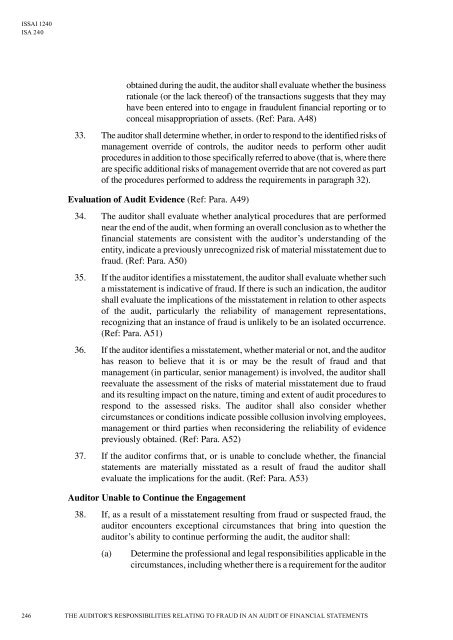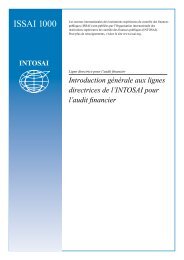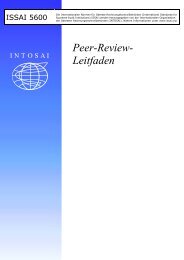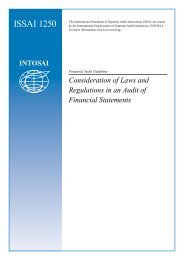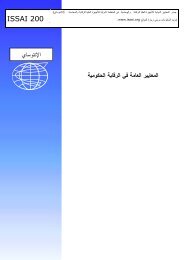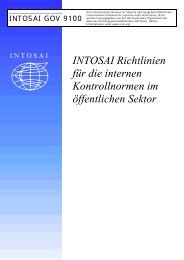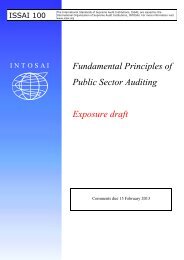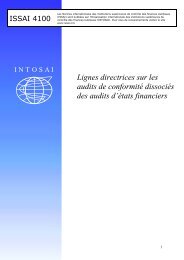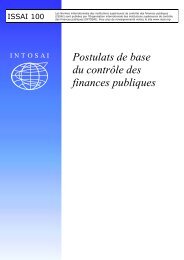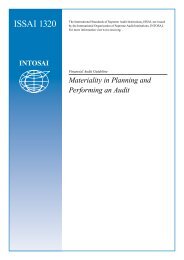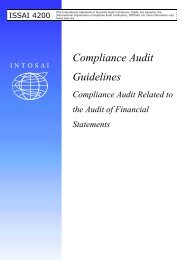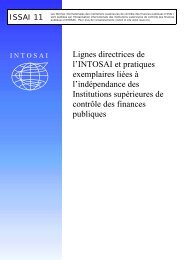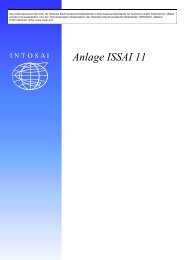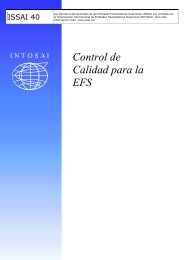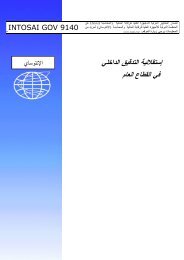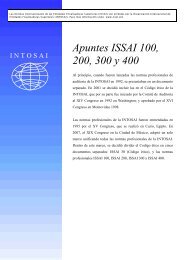ISSAI 1240
ISSAI 1240
ISSAI 1240
Create successful ePaper yourself
Turn your PDF publications into a flip-book with our unique Google optimized e-Paper software.
<strong>ISSAI</strong> <strong>1240</strong><br />
ISA 240<br />
THE AUDITOR’S RESPONSIBILITIES RELATING TO<br />
FRAUD IN AN AUDIT OF FINANCIAL STATEMENTS<br />
obtained during the audit, the auditor shall evaluate whether the business<br />
rationale (or the lack thereof) of the transactions suggests that they may<br />
have been entered into to engage in fraudulent financial reporting or to<br />
conceal misappropriation of assets. (Ref: Para. A48)<br />
33. The auditor shall determine whether, in order to respond to the identified risks of<br />
management override of controls, the auditor needs to perform other audit<br />
procedures in addition to those specifically referred to above (that is, where there<br />
are specific additional risks of management override that are not covered as part<br />
of the procedures performed to address the requirements in paragraph 32).<br />
Evaluation of Audit Evidence (Ref: Para. A49)<br />
34. The auditor shall evaluate whether analytical procedures that are performed<br />
near the end of the audit, when forming an overall conclusion as to whether the<br />
financial statements are consistent with the auditor’s understanding of the<br />
entity, indicate a previously unrecognized risk of material misstatement due to<br />
fraud. (Ref: Para. A50)<br />
35. If the auditor identifies a misstatement, the auditor shall evaluate whether such<br />
a misstatement is indicative of fraud. If there is such an indication, the auditor<br />
shall evaluate the implications of the misstatement in relation to other aspects<br />
of the audit, particularly the reliability of management representations,<br />
recognizing that an instance of fraud is unlikely to be an isolated occurrence.<br />
(Ref: Para. A51)<br />
36. If the auditor identifies a misstatement, whether material or not, and the auditor<br />
has reason to believe that it is or may be the result of fraud and that<br />
management (in particular, senior management) is involved, the auditor shall<br />
reevaluate the assessment of the risks of material misstatement due to fraud<br />
and its resulting impact on the nature, timing and extent of audit procedures to<br />
respond to the assessed risks. The auditor shall also consider whether<br />
circumstances or conditions indicate possible collusion involving employees,<br />
management or third parties when reconsidering the reliability of evidence<br />
previously obtained. (Ref: Para. A52)<br />
37. If the auditor confirms that, or is unable to conclude whether, the financial<br />
statements are materially misstated as a result of fraud the auditor shall<br />
evaluate the implications for the audit. (Ref: Para. A53)<br />
Auditor Unable to Continue the Engagement<br />
38. If, as a result of a misstatement resulting from fraud or suspected fraud, the<br />
auditor encounters exceptional circumstances that bring into question the<br />
auditor’s ability to continue performing the audit, the auditor shall:<br />
(a)<br />
Determine the professional and legal responsibilities applicable in the<br />
circumstances, including whether there is a requirement for the auditor<br />
11<br />
246 The Auditor’s Responsibilities Relating to Fraud in an Audit of Financial Statements


